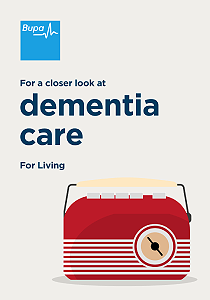Dementia care homes
What is dementia care?
Dementia care offers specialist support to those living with dementia, at a point when standard nursing or residential care may not meet all of your loved one’s needs. Dementia is a set of symptoms rather than a single medical condition: these include problems with thinking, reasoning, learning, memory, language, and daily activities. These progress over time, so it becomes harder for those living with dementia to live independently. At Bupa, we know that having to make decisions about your loved one going into a dementia care home can be very difficult. That’s why we’re here to offer you our full support.
Alternatively, browse by region to discover available care homes within a specific area.

Bupa dementia care homes across the UK
As a leading provider of dementia care, our care homes are focused on providing the very best support for all of our residents living with dementia.
Our priority is to see each of our residents as an individual and to treat them with respect, so they maintain their dignity. We help them to live life the way they want to, and to the fullest extent possible.
With the help of family and loved ones, we get to know our residents well, creating a picture of their life to date and making sure we tailor our care around their likes, dislikes and habits.
When is dementia care appropriate?
The later stages of dementia can be challenging for both the person living with the condition and those close to them. It can be hard to know when the time is right for a person with dementia to move into a care home – and who should make the decision, if the person can’t make it themselves. However, specialist dementia care can help to meet their needs as their condition progresses, and eases the burden and distress of those who’ve been caring for them. If you’re looking for support for a loved one who’s living with dementia, our helpful customer care advisers offer free advice on anything from an understanding chat to finding just the right dementia care home.
Specialist dementia care homes for older people
If your loved one is struggling to live independently, or it’s becoming difficult to keep on top of their care needs, it might be time to consider a specialist dementia care home. Our 24-hour dementia care can ease the worry
Person First training for dementia care
Person First means that we put our residents’ experiences, wellbeing, needs and feelings at the centre of all that we do, and that we have empathy for their daily experience. All of our carers and nurses complete this training, and some have become coaches themselves.
Dementia support inside our homes
To make life a little easier for residents, many of our dementia care homes include picture signs for easy accessibility, contrasting colour schemes to help with identifying rooms and objects, and secure indoor and outdoor spaces.
Common types of dementia
Dementia describes a number of symptoms affecting the brain. This means that there are different types of dementia, and they require different types and levels of care.
Alzheimer’s disease
Here, there is damage to the brain’s ability to send signals between nerve cells. This affects the ability to think and communicate actions to the rest of the body.
Development: Slowly over time,
Early symptoms: Difficulty learning new things; confusion with dates and times.
Vascular dementia
This involves a lack of blood to the brain due to blocked or leaking blood vessels, cause brain cells to die. This can sometimes occur after a series of small strokes.
Development: Fast, getting worse over time.
Early symptoms: Personality changes; memory loss; confusion.
Dementia with Lewy bodies (DLB)
With DLB, clumps of protein form inside brain cells. This is usually in areas responsible for thinking, visual perception and muscle movement.
Development: Slowly over time.
Early symptoms: Hallucinations; fluctuation in mental ability, attention span and alertness; disturbed sleep.

What dementia care support is available?
Dementia care offers specialist support in meeting the needs of those living with dementia symptoms. However, good dementia care also provides support for their family and friends as they come to terms with their loved one’s condition.
At Bupa, our dementia care comes with a personalised care plan for each of our residents. We prioritise getting to know each resident and their relatives individually, so we can best support you all. We tailor our care around everything from the meals each resident most enjoys to the activities they like and their preferred bedtime routine.

Help with funding for dementia care
Understanding how to fund dementia care costs can be confusing. Our dementia care homes are available to everyone, so you don’t have to be a Bupa customer.
You might be eligible for financial support from your local authority. Our customer care team will talk you through your options for funding your loved one’s dementia care.
Learn more about dementia and providing support

What's the difference between Alzheimer’s and dementia?
Bupa's dementia lead, Fran Vandelli explains more about Alzheimer’s and dementia and what is meant by both terms.

How to support someone to live well with dementia
Explore how you can help someone with dementia live life to the fullest by prioritising their mental and physical health.

Maintaining communication with people living with dementia
Read our health expert’s information on dementia and communication to help you and your loved one understand each other better.

Dementia and sundowning
Read our health expert's advice for supporting those living with dementia whose symptoms worsen as the day progresses sometimes known as sundowning.

Help when you need it
Choosing a care home can be stressful, especially if you've never done it before. Where do you start? Well, right here. Our helpful, understanding care advisers offer free advice on anything from funding to finding just the right home.
Call a customer care adviser on 0345 600 4622^
Ask us to assess your situation and talk to you about paying for care, and how funding works.
Find care homes that might be right for you, and book one or more visits.
^ Lines are open 8am to 6.30pm Monday to Friday, 9am to 12.30pm Saturday. Closed Sundays and bank holidays. Calls are charged at no more than local rate and count towards any inclusive minutes from mobiles. We may record or monitor our calls.






